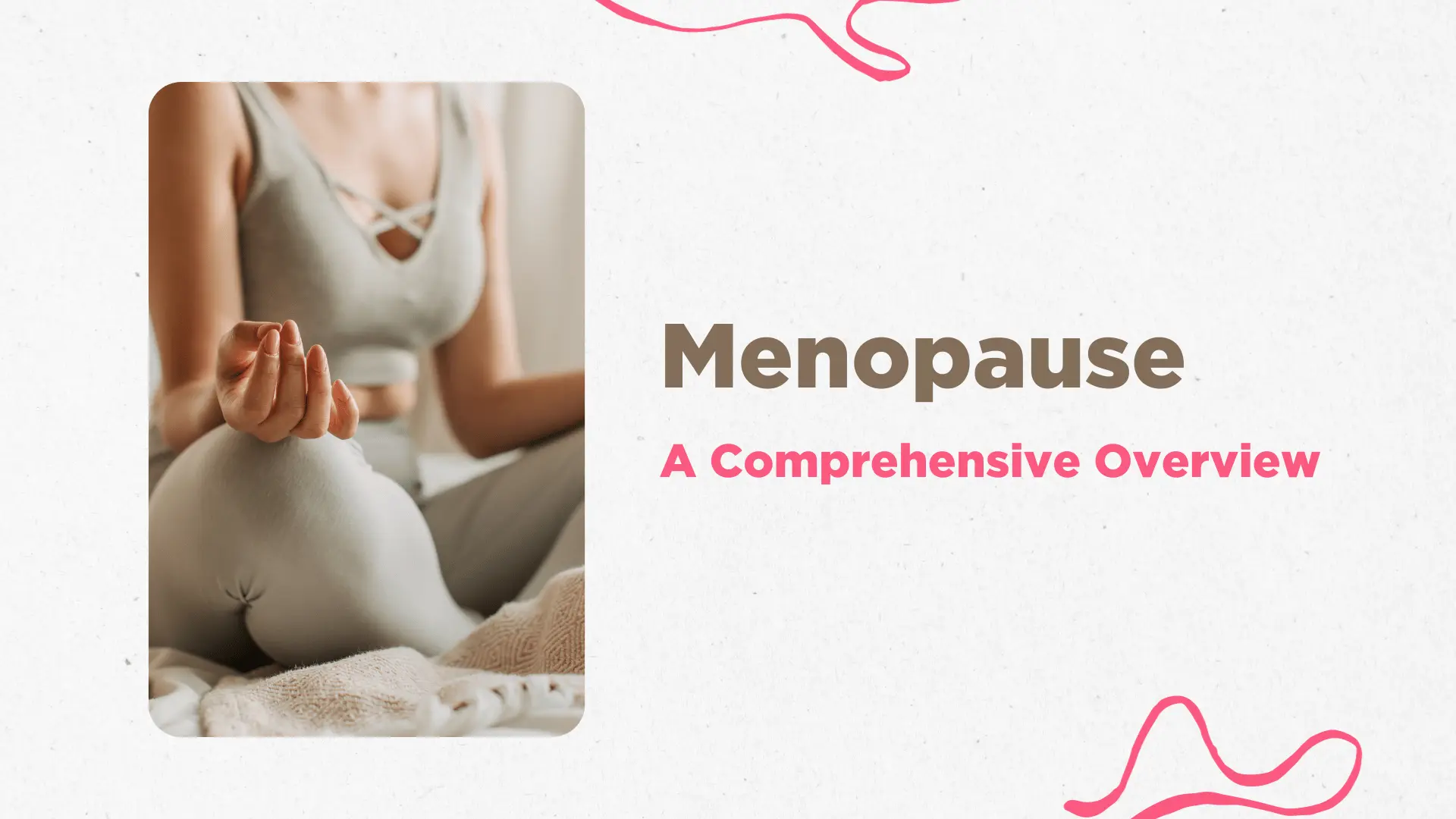Menopause is a transitional phase of regular physiological changes in a woman’s life when her monthly period stops, and the female ovaries stop follicular production each month, resulting in the permanent loss of her menstrual cycle. 45 to 55 years is considered as an average age for menopause. It may be natural or sometimes due to the surgical removal of ovaries for treatment.
The menopausal transition is when a female starts to face menopause symptoms before the cessation of periods. When menstrual periods do not last over a year, the ovaries ultimately stop releasing hormones and lose the ability to get pregnant.

Common symptoms of menopause are
Hot flashes, sudden flicking of heat, sweating, and flushed skin
What are the physical effects of menopause on women’s bodies?
- Night sweats or cold flashes
- The vaginal dryness of the body does not produce any lubrication due to decreased libido.
- Urinary urgency (the feeling of an urge to pass urine)
- Difficulty sleeping (insomnia)
- Emotional changes (mood swings or depression)
- Dry skin, dry eyes, or dry mouth.
- Breast tenderness.
- Worsening of premenstrual syndrome (PMS).
- Irregularity in periods can be observed; it could be lighter or heavier.
- Bone weakening may lead to osteoporosis.
- dyspareunia(painful intercourse)
- Muscle tone is reduced in the pubic area, resulting in the vagina, uterus, or urinary bladder falling out of their position (prolapse).
Riding the Hormonal Roller Coaster: Exploring the Physical Symptoms of Menopause
Effect on Reproductive System
- Changes in hormones lead to thinning of the vaginal wall, less elasticity, and more pain during intercourse.
- Yeast infections are increasing.
- Menopause adversely affects the reproductive system as it decreases libido.
The Effect of menopause on the skin
- The Effect of Menopause on the skin shows some noticeable changes. As hormone levels in the body fall, your skin thins, making it more prone to bruising. Some women may report an increase in facial hair or drier skin. Dry skin occurs due to menopausal changes that affect your skin’s capacity to keep water. When the air is dry, skin dryness is more visible.
- Menopause can raise your risk of skin cancer and pre-cancerous skin development, making your skin thinner and drier. Fortunately, with correct care and habits, you may retain good skin during and after menopause.
- Vaginal dryness and the thickening of cervical mucus is also reduced.
- To protect your skin, use sunscreen every time you walk outside, even if the weather is gloomy. It can help lower skin cancer risk, erase age spots, and prevent new ones from emerging. It’s also a good idea to see a dermatologist if you notice any changes in your skin.
Effect of Menopause and Hair Loss
Most people have generalized hair loss during menopause. Hair may also come out in huge clumps, especially after you wash and brush. According to research, the effect of menopause on hair is caused by a hormonal imbalance. This symptom is directly connected to low levels of estrogen and progesterone, as one of these hormone’s functions is to promote hair development and keep the hair on the head for extended periods. As a result, when these hormones are low, hair grows slower and may fall out faster.
When progesterone and estrogen levels fall, androgens, male hormones that shrink hair follicles, increase production and release.
Another factor that leads to hair loss is stress. The rise in androgen levels also explains why you may develop more facial hair following menopause. These little hair sprouts are usually seen on the chin.
Can menopause lead to depression?
Yes, various menopausal factors can contribute to depression. During menopause, your body undergoes several changes. Hormone levels are excessive, you may not sleep well due to hot flashes, and you may have mood changes. Anxiety and dread may also be present at this time.
Effect of menopause on the nervous system
There is fluctuation in hormones our reproductive system produces, including progesterone, estrogen, and testosterone. Besides this, a marked drop in serotonin occurs, which is responsible for supporting mood. Estrogen is also considered to protect the nerves, the brain, and their functions; the declination of estrogen triggers mood disorders, cognition, memory, and focus. A person may start to feel other nerve-related symptoms such as tingling, paraesthesia, and pain/
Paraesthesia, pins, and needling, with a declination of estrogen
Studies suggest a relationship between low estrogen levels and cognitive symptoms, which affect memory and learning.
Once the postmenopausal phase starts, these symptoms mostly resolve on their own.
Effects of menopause on Bone
Osteopenia is a term used to define low bone density, and osteoporosis is used for the destruction and deterioration of bone mass, resulting in bone weakness, more commonly found after menopause. A lower estrogen level causes the bone to lose density, increasing the fracture risk. Bone thinning is a natural aging process, but reduced estrogen increases it. Hormone replacement supplements with adequate calcium reduce the risk of fracture. Weight-bearing exercise helps to strengthen bones.
Effects of menopause on the cardiovascular system
The lower estrogen level increases the risk of cardiovascular disease by affecting cholesterol levels. After menopause, the metabolism process slows down, which ultimately increases weight. So eating less and exercising more is recommended to maintain weight and cholesterol.
Effect of menopause on sleep/Insomnia
A drop in estrogen due to menopause affects sleep. Sleepiness is mainly associated with hot flashes and night sweats that awake people. The uncomfortable sensation of hot flashes (feeling of heat) during the day or night. Sleep deprivation increases headaches, anxiety, irritability, mood disorders, and impaired focus and memory.
Snoring sleep apnea is a common problem during the post-menopausal phase; other sleep disorders like restless leg syndrome and periodic limb movement also interfere with decreased sleep quality.
Here are some suggestions that will help a person get better sleep.
- The loose dress material used in the cloth should be natural and pure, like cotton.
- The bedroom should be well-ventilated and cool.
- Avoid spicy food just before bed, as it may stimulate sweating.
- Maintain regularity in your bedtime routine, i.e., sleep simultaneously.
- Avoid daytime naps.
- Make sure to empty the bladder before going to bed.
- Avoid caffeine, alcohol, and nicotine.
- Exercise regularly.
Effect of menopause on Urinary incontinence
Reduced estrogen levels may lead to weakness in the pelvic floor, causing a drop in pelvic floor muscles. Weak pelvic muscles cause dribbling of urine while sneezing, coughing, pressure urgency, intensity, and urine frequency are also increased. Effects of menopause on the pelvic organ are common. It degrades the urinary system and vagina, known as Urogenital atrophy.
These urine alterations occur for two reasons: Menopause diminishes the quantity of the female hormone estrogen, and a lack of estrogen reduces the urinary tract’s capacity to regulate urine. Advanced age, which generally corresponds with menopause, has various adverse effects on the pelvic organs and tissues.
Symptoms include the desire to urinate more frequently, the inability to regulate urine (incontinence), vaginal dryness and irritation, and increased urinary tract infections.
Is there anything else that can happen emotionally during menopause?
Menopause can result in several emotional changes, including:
- Inability to focus and a need for more motivation.
- Anxiety, sadness, mood swings, and stress
- Irritability and aggressiveness.
- All of these emotional changes can occur independently of menopause. You’ve undoubtedly faced some of them in your life.
Your physician may be able to prescribe a prescription to assist you (such as a hormone treatment or an antidepressant). When dealing with emotional changes during menopause, support groups or counseling might be helpful.
What effect does menopause have on my bladder control?
Unfortunately, menopause mainly affects bladder control due to changes in hormone levels (commonly called urine incontinence). There are various causes for this, including.
Oestrogen. Oestrogen performs several functions in your body, including maintaining the lining of your bladder and urethra.
Pelvic floor muscles. They support the pelvic organs, such as the bladder and uterus. These muscles might deteriorate over time. It can occur during pregnancy, delivery, or as a result of weight increase. Urinary incontinence (leakage) may develop when the muscles weaken.


